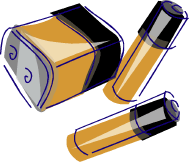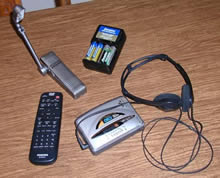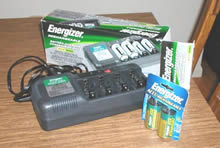|
If you're trying to figure out what type of batteries to get for junior's new Game-A-Tron or if you're trying to decide whether you should buy the Epi-Torture Leg Shaver
 with the built-in battery or not, the subject of rechargeable batteries may be buzzing around in your head. The bottom-line question is: Are rechargeable batteries worth the extra up-front cost, and if so, which type is best?
with the built-in battery or not, the subject of rechargeable batteries may be buzzing around in your head. The bottom-line question is: Are rechargeable batteries worth the extra up-front cost, and if so, which type is best?
Because there are many different types of batteries and battery uses, there is no one answer to those questions. But we can make a few recommendations that will help you. This article focuses on standard consumer batteries—the AA, AAA, C, and D batteries you typically put in your portable devices and toys. There are three main considerations:
- cost,
- performance for a given application, and
- environmental friendliness.
We're going to give you a bunch of important "battery answers" right up front:
- Yes, rechargeable batteries make economic sense in most cases.
- Nickel-metal-hydride (NiMH) are the best rechargeable batteries you can get from several standpoints, including performance and low toxicity for the environment.
- Although today's disposable alkaline batteries can be thrown in the trash, all rechargeable batteries should be recycled.
But there's a little more to rechargeable batteries than that, so we hope you'll read on. We want you to get the most possible benefit from your new rechargeable batteries, and there are a few pieces of information that will help you do that.
Rechargeable batteries almost always make economic sense. The upfront cost of setting yourself up with rechargeable batteries and the charger may seem off-putting at first, especially when you realize that you'll want to have some extra batteries that can be recharging while you're running devices like your Walkman, wireless computer mouse, and battery-powered toys.
Let's walk through a cost analysis by considering the following scenario. Say you have a few
 different devices that use AA batteries, and you want to be able to have a total of eight batteries to power them at any given time. You also want four spares that can be charging while the other batteries are in use.
different devices that use AA batteries, and you want to be able to have a total of eight batteries to power them at any given time. You also want four spares that can be charging while the other batteries are in use.
The total cost for this scenario—12 rechargeable batteries plus the charger—will be about $75.00. That may sound like a lot of up-front spending when you consider that you can buy an 8-pack of disposable AA batteries for about five bucks. But if you're like most households and it seems like every other trip to the store finds you buying another 8-pack of throw-aways, then rechargeables will definitely be the better deal.
For instance, under the scenario above, if you're now buying a five-dollar 8-pack of batteries every month, that's a yearly cost of $60. After a little more than a year, your $75 initial investment in the rechargeable setup will be paid for, and the next 10 years of battery use will be free. Over that period, you would save $600! And it will be 1,000 fewer disposable batteries going into your nearby landfill or incinerator.
If you don't use that many batteries—say a couple of 8-packs per year—you could still actually save money over the long run with rechargeables, though that would depend on the types of uses. But rechargeable batteries make the most sense for devices that get heavy to moderate use and have a high to medium current draw. These are the devices you find yourself changing batteries for at least once a month, or every couple of months at a minimum.
There are some uses where rechargeable batteries simply do not make economic sense:
- low-draw devices like battery-powered wall clocks, smoke detectors, and remote controls;
- devices that have long idle times (measured in months), like emergency flashlights—unless you're willing to shell out the extra dough it takes to buy lithium-ion rechargeable batteries. (More on those below.)
There are several types of rechargeable-battery chemistries:
Nickel-Cadmium (Nicad) batteries—usually pronounced "ny-cad"—are a primary form of rechargeable battery, though they are being used less these days because of the toxicity of cadmium.
Nickel-metal-hydride (NiMH) batteries are probably the most common form of rechargeable now, at least in the standard consumer sizes of rechargeables. Early versions of NiMH rechargeables had problems with too-rapid
 discharge, but those problems have been solved in current models. Because NiMH rechargeable batteries now perform better than Nicads and are free of toxic heavy metals, Nicads are being abandoned by some manufacturers in favor of NiMHs. In any event, NiMHs are usually going to be the best all-around choice for most applications in the heavy to moderate usage range.
discharge, but those problems have been solved in current models. Because NiMH rechargeable batteries now perform better than Nicads and are free of toxic heavy metals, Nicads are being abandoned by some manufacturers in favor of NiMHs. In any event, NiMHs are usually going to be the best all-around choice for most applications in the heavy to moderate usage range.
Rechargeable alkaline batteries are different than the "normal" alkaline batteries you buy in 4-packs and 8-packs at the store in standard "consumer sizes" like AA, AAA, C, D and 9-volt. Rechargeable alkaline batteries have poorer long-term performance and recharge characteristics compared to Nicads and NiMHs, and unless you're looking for an inexpensive rechargeable battery that is ready to use right out of the package (without recharging), we suggest you avoid them. And in case you run across an ad for a device that says it can recharge normal alkaline batteries, forget it—it's a scam.
Lithium-ion batteries are very good and have excellent shelf life—i.e. their charge does not go down when they're just sitting around not being used—but they're more expensive than other types of rechargeable batteries. That means they're usually only a good choice for occasionally used emergency devices or high-drain devices like portable televisions, digital cameras, laptops, and cell phones. If you use such devices often and you have the option to buy them with a built-in lithium-ion rechargeable battery, it's worth doing.
You should be able to get hundreds of recharging cycles out of all of these types of batteries—except alkaline rechargeables.
|


